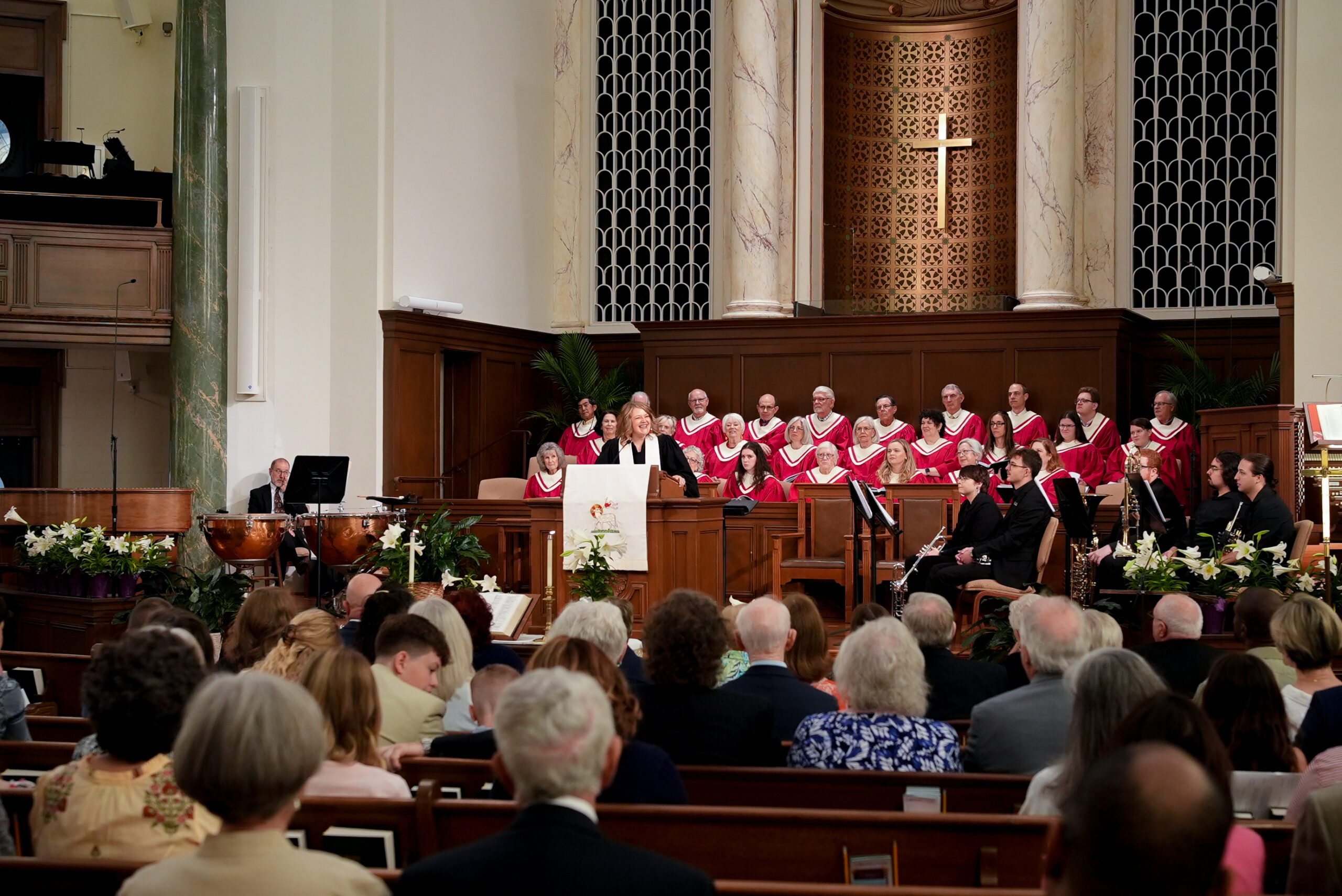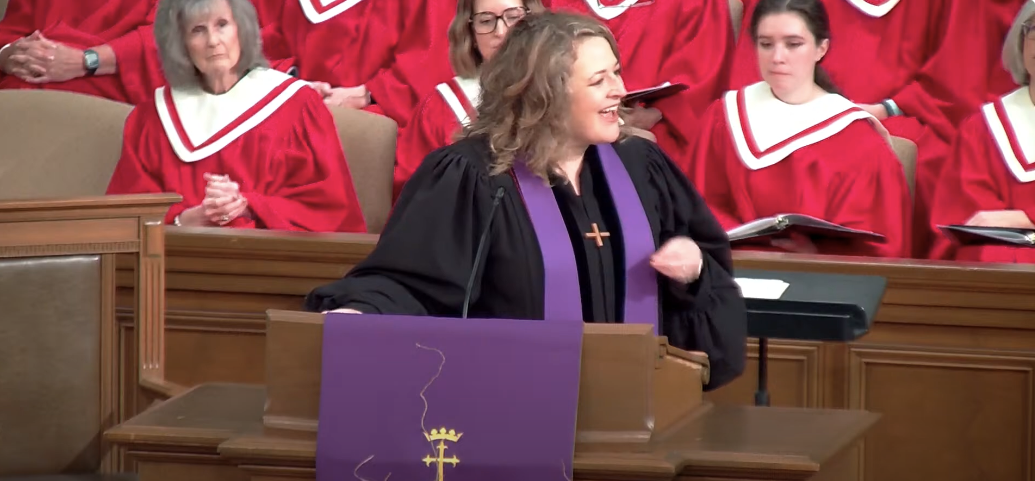I.This past week, I enjoyed a lecture on Monday night over at Wake Forest’s Divinity School. As I was entering the building, I shared in brief conversation with a vibrant and gifted student about how she’s doing just past the midpoint of her three-year seminary arc. “Ugh… Emilyyyyy,” she wailed, “I think I’m feeling called into church ministry, so there’s that!” Her inner anguish was palpable, and in a flash of deja vu, I remembered it.
Some 16 years prior, also in the spring semester of my second year, I had shared a similar stirring with my family. I had already made a defiant announcement to my family upon the decision to go to seminary in the first place. “Now just because I’m going to divinity school,” I insisted, “does NOT mean I’m going to work in a church, and it definitely does not mean I’m going to become a minister! I’m not! I mean it! Really!” (The lady doth protest too much, methinks!)
Yet two years and a host of experiences and stirrings and holy nudges later, I was back in the den of my grandparents’ house – the minister-side of my family – where again, I was reflecting with them on my time in seminary, and where it was leading. My edges were at their sharpest and roughest in those years. Subtleties, and nuance, and the complexities that shape a set of convictions weren’t yet in my field of view.
There with me was my Granddaddy Bill. He of the 50+ year life of service among Baptists as pastor of local Baptist churches. Dean of the School of Theology and Provost at the preeminent Southern Baptist Seminary. Provost and university professor at a Baptist college. Shaper of Baptist thought and scriptural interpretation and theology for generations of Baptist leaders, whose perspectives particularly on the role of women in the church made him a target to silence for the rising fundamentalist wing of Southern Baptist life, and whose conviction about God’s indiscriminate calling for women and men alike became the lightning rod of biblical interpretation that ultimately led to his departure from the denomination he’d loved and served for decades. So when this beloved grandfather of mine asked me what I was hearing from God in those years, I audaciously and flippantly told him that though I thought I might be hearing a call to ministry in the local church, I most certainly wouldn’t pursue that calling in a Baptist church, because, and I embarrassingly quote, “I’m not going to spend the rest of my life apologizing for being a woman in ministry.”
My Granddaddy Bill was many things – wise, scholarly, disciplined, faithful. Hot-headed, he was not. But he yelled at me, yes he did, right then and there. In that moment of righteous anger – the only moment of anger I ever saw from him – he called out my privilege with a needed corrective: “we did not do what we did, so that you could go be a Methodist!”
II. I heard him. And years later, I understood him and that righteous anger. At its core, it wasn’t denominational. It wasn’t about my identity or where my calling would lead. Rather his critique was aimed at my limited view that I best knew God’s purposes, calling out the lie that I should be afforded all the privilege but none of the responsibility, that my life and ministry should be sorted first by comfort and lack of risk. In the clarity of his anger, he flipped over the neatly-sorted table of my convictions and drove out the false piety of my heart. I was worshiping at the wrong temple, you see. Anger, particularly anger laced with justice, isn’t unfamiliar to us. We know it, we hear it, we practice it, we learn it. Sometimes in order to shake off the dust of indifference and cut through the noise of distraction, we have to find an inner fire to be heard and understood. It’s as Frederick Douglass once said: “O! had I the ability, and could reach the nation’s ear, I would, to-day, pour out a fiery stream of biting ridicule, blasting reproach, withering sarcasm, and stern rebuke. For it is not light that is needed, but fire; it is not the gentle shower, but thunder. We need the storm, the whirlwind, and the earthquake.”1
Sometimes to change the way things are, righteous anger is necessary. We often find our way there by identifying what author Liz Gilbert calls “not this.” You know that moment of realizing that, in her words “we’re in the wrong place – or at least, in a very bad place.”2 Not this way of being church. Not this way of provoking war. Not this racism or that xenophobia. Not this abuse of our planet or that toxicity in a relationship. Not this hustle culture, or purity culture, or cancel culture, or consumer culture. Not this.
III. I have to believe that’s what was on Jesus’ mind that day when he arrived at the Temple. This story is recorded in all four gospels, adding to his historical significance. In Matthew, Mark, and Luke, Jesus cleanses the temple at the end of his life, one of the reasons cited for his arrest and persecution. But as the Gospel of John tells it, he’s at the beginning of his ministry, fresh off his first miracle – changing the water into wine at a wedding with his mama in tow – and in Jerusalem for Passover. You can just imagine the scene at the Temple when he arrived. The faithful came by the thousands, their long journeys in a holy season culminating in the holiest of places — the temple, the place where God was uniquely found and mediated. But no matter who you were, you couldn’t just walk into the temple. Rather, you had to first pay your temple tax, a fee assessed on all believers for the upkeep of the house and grounds. And that tax certainly couldn’t be paid with Roman coins or Greek coins, those which bore the hated image of Caesar, so money changers were there to exchange the currency of empire for the shekels of the sacred. Then were you to want to offer a gift to God during this high and holy season of Passover — perhaps an animal sacrifice, as was the custom — such animals could not bear any blemish. But who among the travelers could have managed to go all the way to Jerusalem with a flawless animal? Hardly a one, which opened up a market to sell animals right there at the temple.3
Now as we explore what the 1st century Jewish temple practices would be, it would be irresponsible of us to not name how anti-Semetic interpretations have emerged from it over the years. So let’s remember: Jesus was a Jew. And Jewish pilgrims to the temple had been given the law from the Lord which included precise instructions on how they were to approach the temple, and offer sacrifices, and pay the temple tax. Nothing they were doing was illegal or discouraged. Scholars even remind us that it’s only within our Christian interpretation of this event that we’ve drawn the assumption of Jesus’ concern that the money-changers were abusing their power.4 Rather, they were acting out of their faithfulness firmly within their religious tradition.
Yet Jesus’s action here is as important symbolically as it is literally. At the outset of his ministry in the Gospel of John, it frames all that will follow. For that day, he stands the long tradition of the prophets who speak for the Lord. Jesus echoes the righteous anger of Jeremiah who first asks if “this house … has become a den of robbers. Of Isaiah who demands, “trample my courts no more; bringing offerings is futile; incense is an abomination to me.” Of Hosea, who “desires steadfast love and not sacrifice, the knowledge of God rather than burnt offerings. Of Amos, who says of God, “I hate, I despise your festivals. I take no delight in your solemn assemblies. I will not accept your burnt offerings. I will not listen to your songs or the melody of your harps, but let justice roll down like waters, and righteousness like an ever-flowing stream.”5 And so on, and so on.
It seems to me that Jesus, like the prophets before him, are most deeply concerned that the site of the very heart of the faith is missing the very heart of the faith! Not that the people in their individual actions have done this, but that the very system itself needed renovation. That they’re following the letter of the law and missing the purpose and the spirit of the law. That the system maintains boundaries around God at the expense of access to God. That Jesus, in his very life and body, is about the mission of reconciliation and justice, and when worship substitutes for justice, it’s as if the people were worshiping at the wrong temple. Not this, he says. As one writer says,“holiness will overflow conventional bounds, and the-temple-as-we-know-it will give way to a more widespread, accessible, direct mode of encountering God.”6 Jesus flipped over the neatly-sorted tables of their convictions and drove out the false piety of a system that self-perpetuated it, insisting that God had come closer, that God was here in him.
IV.It’s alluring, this drive toward righteous anger, particularly righteous anger toward a religious system we perceive to be in peril or impoverished of its heart. It appeals to our sense of justice, our desire to differentiate and make right. Yet we’d do well to remember that in this story, we’re not Jesus. Rather, far too often, we’re the faithful, staffing our tables and attending our religious tasks unaware that anything is wrong in the first place. Or we’re the conflict-averse, unwilling to acknowledge an injustice among us because of the false idol of uniformity. In all the years since my granddad’s flash of righteous anger, I wish I could tell you that I’ve not since looked down my nose at another religious establishment. But I confess, I have. (Perhaps you can relate.) How delicious it would be to lick the lips of our anger against the religious establishment that most easily draws our ire. How salacious it would be to revel in a denominational downfall, or a church’s adventure in missing the point, or a religious leader’s come-uppance of humility they’d never choose, all in the spirit of holy rage. How easy it would be to miss the log in our own eyes because we’re too busy locating the tables to overturn in another, or because we’re too emotionally invested in the tables we have and the convictions that fill them! In all of this, how tempting it would be to think ourselves as Jesus, and insist we know the heart of the matter, unwilling or unable to see the sacrifices we’re burning in a false show of holiness.
“Church should not be a place to reinforce my prejudices and illusions,” theologian Dan Clendenin says. “Jesus disrupts what religion makes safe and cozy. He never once says ‘understand me.’ He says something far more radical.”Follow me.””7
Friends, I believe our call of Jesus today is to let our anger be justice-fueled like Jesus and the prophets before him. But that righteous anger should always follow an invitation we extend willingly to Jesus: an invitation to enter into our own religious traditions, or church organizational systems, or preferred ways of finding God, or even the practices we hold dear, and drive out what is causing us to worship at the wrong temple. To exchange our table of convictions for a table to share with friend and neighbor and enemy alike. To let our hearts soar with the zeal of Jesus: locating ourselves where he was, lest we miss the very heart of it all. To let love compel our very lives.
Will we?










